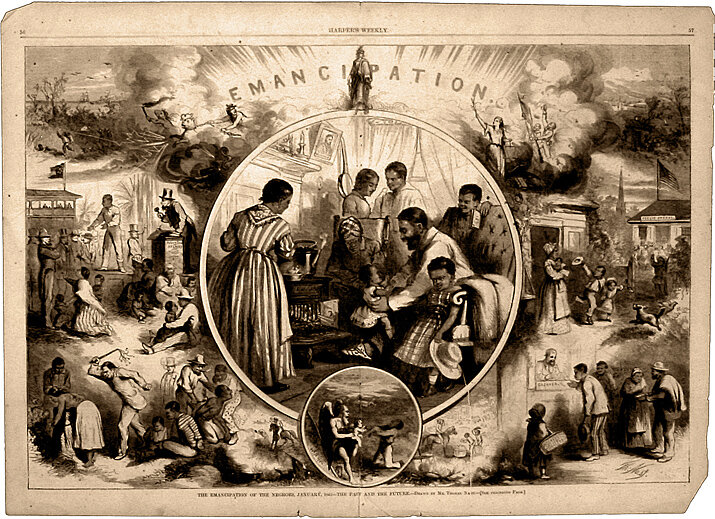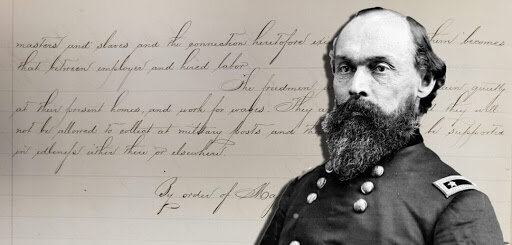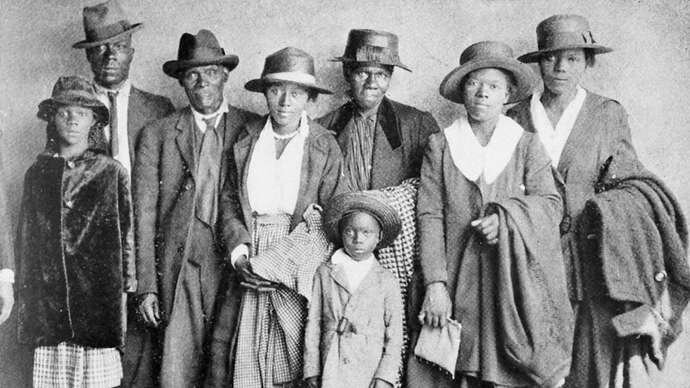
History and Origins of Juneteenth

History and Background
Galveston 1865
Juneteenth is the oldest nationally celebrated commemoration of the ending of slavery in the United States. Dating back to 1865, it was on June 19th that the Union soldiers, led by Major General Gordon Granger, landed at Galveston, Texas with news that the war had ended and that the enslaved were now free.
This was two and a half years after President Lincoln’s Emancipation Proclamation - which had become official January 1, 1863. The Emancipation Proclamation had little impact on the Texans due to the minimal number of Union troops to enforce the new Executive Order.
However, with the surrender of General Lee in April of 1865, and the arrival of General Granger’s regiment, the forces were finally strong enough to influence and overcome the resistance.
In the early years
Little interest existed outside the African American community in participation in the celebrations. In some cases, there was outwardly exhibited resistance by barring the use of public property for the festivities.
Most of the festivities found themselves out in rural areas around rivers and creeks that could provide for additional activities such as fishing, horseback riding and barbecues. Often church grounds were the site for such activities.
Eventually, as African Americans became landowners, land was donated and dedicated for these festivities. One of the earliest documented land purchases in the name of Juneteenth was organized by Rev. Jack Yates.
Booker T. Washington
This fund-raising effort yielded $1000 and made possible the purchase of Emancipation Park in Houston, Texas. In Mexia, the local Juneteenth organization purchased Booker T. Washington Park, which had become the Juneteenth celebration site in 1898.
Booker T. Washington
There are accounts of Juneteenth activities being interrupted and halted by white landowners demanding that their laborers return to work. However, it seems most allowed their workers the day off and some even made donations of food and money.
For decades these annual celebrations flourished, growing continuously with each passing year. In Booker T. Washington Park, as many as 20,000 African Americans once attended over the course of a week, making the celebration one of the state’s largest.

Juneteenth in the 20th Century
Change and Decline
Economic and cultural forces led to a decline in Juneteenth activities and participants beginning in the early 1900’s. Classroom and textbook education in lieu of traditional home and family-taught practices stifled the interest of the youth due to less emphasis and detail on the lives of former slaves.
Classroom textbooks proclaimed Lincoln’s Emancipation Proclamation of January 1, 1863 as the date signaling the ending of slavery - and mentioned little or nothing of the impact of General Granger’s arrival on June 19th.
The Depression
The Depression forced many people off the farms and into the cities to find work. In these urban environments, employers were less eager to grant leaves to celebrate this date. Thus, unless June 19th fell on a weekend or holiday, there were very few participants available. July 4th was already the established Independence holiday and a rise in patriotism steered more toward this celebration.
African American family from the rural South arriving in Chicago, 1920.
Schomburg Center for Research in Black Culture, Jean Blackwell Hutson Research and Reference Division, The New York Public Library (1168439)
Through Civil Rights
The Civil Rights movement of the 50’s and 60’s yielded both positive and negative results for the Juneteenth celebrations. While it pulled many of the African American youth away and into the struggle for racial equality, many linked these struggles to the historical struggles of their ancestors. This was evidenced by student demonstrators involved in the Atlanta civil rights campaign in the early 1960’s, who wore Juneteenth freedom buttons. Again in 1968, Juneteenth received another strong resurgence through the Poor Peoples March to Washington D.C.
Rev. Ralph Abernathy’s call for people of all races, creeds, economic levels and professions to come to Washington to show support for the poor. Many of these attendees returned home and initiated Juneteenth celebrations in areas previously absent of such activities. In fact, two of the largest Juneteenth celebrations founded after this march are now held in Milwaukee and Minneapolis.

Juneteenth Today
Juneteenth today, celebrates African American freedom and achievement, while encouraging continuous self-development and respect for all cultures.
As it takes on a more national, symbolic and even global perspective, the events of 1865 in Texas are not forgotten, for all its roots tie back to this fertile soil from which a national day of pride is growing.
Juneteenth is enjoying a phenomenal growth rate within communities and organizations throughout the country. Institutions such as the Smithsonian, the Henry Ford Museum and others have begun sponsoring Juneteenth-centered activities.
In recent years, a number of local and national Juneteenth organizations have arisen to take their place alongside older organizations - all with the mission to promote and cultivate knowledge and appreciation of African American history and culture.
Celebrations
Festivities & Fun
A range of activities were provided to celebrate the event, many of which continue in tradition today. Rodeos, fishing, barbecues and baseball are just a few of the typical Juneteenth activities you may witness today. Juneteenth almost always focused on education and self-improvement.
Thus, often guest speakers are brought in and the elders are called upon to recount the events of the past. Prayer services were also a major part of these celebrations.
Nationwide
Cities and States across the U.S. and beyond are realizing the opportunity to come together in appreciation, reconciliation and commemoration.
During Juneteenth we acknowledge the African American spirit and pay tribute to the roles and contributions which have enriched our society.
Juneteenth celebrations are now held in most, if not all, 50 states. Over half have passed some form of legislation establishing Juneteenth as a Special Day of Recognition. Several other states have similar legislation pending. The recognition and honor of Juneteenth extends even beyond our borders. Expatriates, teachers, servicemen and others have continued their celebrations internationally. In over 20 different countries.
In North Carolina
Various celebrations/events are held across NC to commemorate Juneteenth (Charlotte, Carrboro, Cary, Chatham County, Durham). These events run the gamut from festivals to lunch and learns (food truck rallies, cookouts, Family day, freedom bike rides, tours through old black neighbors/plantations, museums of history, etc.)
In Garner
Unfortunately, per contacts from some of our oldest black citizens, Juneteenth was not celebrated/recognized in Garner.
But Garner’s history runs deep with civic pride in its diverse roots and its diverse future to come.
